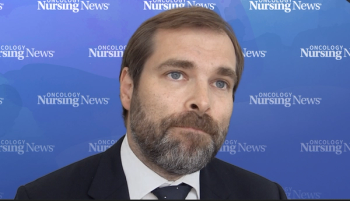
Patients with metastatic castration-resistant prostate cancer who received radium-223 prior to docetaxel had better quality of life and tolerability scores than those who received docetaxel first.

Patients with metastatic castration-resistant prostate cancer who received radium-223 prior to docetaxel had better quality of life and tolerability scores than those who received docetaxel first.

A nurse practitioner discusses her role in caring for patients with multiple myeloma, and how advanced practice providers have a unique skillset to offer in cancer care.

Adagrasib outperformed docetaxel in patients with KRAS G12C-mutated non–small cell lung cancer, regardless of baseline brain metastases.

Earlier switch to atezolizumab after run-in with vemurafenib plus cobimetinib showed promise in improving OS rates in BRAF V600–positive melanoma.

Guiding treatment via response predictive subtype could be beneficial for identifying patients with high-risk breast cancer who may respond to Dato-DXd plus durvalumab.

Pembrolizumab led to improved survival over ipilimumab in patients with unresectable advanced melanoma, according to long-term data.

The FDA approved isatuximab plus bortezomib, lenalidomide, and dexamethasone for patients with newly diagnosed myeloma who are ineligible for ASCT.

NKT2152, a novel HIF2a inhibitor, demonstrates significant efficacy in patients with advanced clear cell renal cell carcinoma.

During a Community Case Forum series, breast cancer experts discussed the importance of testing for ESR1 mutations, in particular with the use of elacestrant, in HR-positive, HER2-negative metastatic breast cancer.

The FDA approved amivantamab-vmjw plus chemotherapy for locally advanced or metastatic non–small cell lung cancer (NSCLC) that harbors EGFR exon 19 deletions or exon 21 L858R substitution mutations whose disease has progressed on or after treatment with an EGFR TKI.

Trastuzumab deruxtecan improved time to deterioration for pain and other categories, in patients with HER2 low/ultralow breast cancer.

Nivolumab, given with or without ipilimumab, showed durable 10-year survival outcomes in patients with advanced melanoma.

Breastfeeding is feasible for patients with hormone receptor–positive breast cancer who are undergoing a break of endocrine therapy.

Datopotamab deruxtecan(Dato-DXd) demonstrated antitumor activity in patients with advanced/metastatic ovarian or endometrial cancer who had prior chemotherapy treatment.

The FDA approved pembrolizumab plus pemetrexted and platinum chemotherapy for advanced or metastatic malignant pleural mesothelioma.

Zipalertinib was safe and effective for heavily pretreated patients NSCLC harboring EGFR exon 20 insertion mutations who progressed on or after amivantamab.

Amivantamab plus chemotherapy delivered promising OS trends compared with chemotherapy in EGFR-mutant advanced non-small cell lung cancer after disease progression on osimertinib.

The Food and Drug Administration approved ribociclib plus an aromatase inhibitor for hormone receptor (HR)–positive, HER2-negative stage II and III early breast cancer that has a high risk of recurrence.

While none of the experimental combinations met efficacy targets, durvalumab with monalizumab and ceralasertib showed promising long-term benefits in patients with advanced NSCLC.

The duo of TAR-200 and cetrelimab was safe and efficacious in the neoadjuvant setting for certain patients with muscle-invasive bladder cancer.

Adding relatlimab to nivolumab and chemotherapy improved efficacy but did not increase safety concerns in advanced-stage lung cancer.

For patients with early breast cancer, hypofractionated radiation was noninferior to normofractionated radiation regarding lymphedema risk.

Presurgical durvalumab plus chemotherapy, followed by adjuvant durvalumab, led to improved survival in patients with cisplatin-eligible muscle-invasive bladder cancer (MIBC).

Patients with early-stage triple-negative breast cancer tended to have improved survival with neoadjuvant pembrolizumab plus chemo followed by adjuvant pembrolizumab.

Patients with Claudin-6–positive advanced solid tumors, including platinum-resistant ovarian cancer, tended to respond to therapy with TORL-1-23

While adjuvant pembrolizumab and chemotherapy with or without radiation did not boost DFS in the overall high-risk endometrial cancer population, but showed a trend toward improved DFS in one patient subgroup.

Retifanlimab plus carboplatin and paclitaxel boosted PFS for certain patients with recurrent or metastatic SCAC.

The addition of radium-223 to enzalutamide led to significant rPFS and OS benefits compared to enzalutamide alone in metastatic castration-resistant prostate cancer.

Lenvatinib, pembrolizumab, and TACE outperformed placebo plus TACE in progression-free survival for intermediate-stage hepatocellular carcinoma.

Pembrolizumab plus chemoradiotherapy improved survival in patients with previously untreated, high-risk locally advanced cervical cancer.